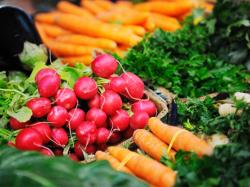Groups To Build A Sustainable Regional Food System In Six New England States
March 31, 2014 | 4 min to read

BOSTON — American Farmland Trust, Conservation Law Foundation and the Northeast Sustainable Agriculture Working Group released a report today geared toward generating a serious discussion on building a sustainable, regional food system in six New England states.
The report, New England Food Policy: Building A Sustainable Food System, is the result of nearly two years of research and interviews with key players in the food system on how to increase economic opportunities for farmers and healthy, local food choices for consumers.
The states covered by the report include Connecticut, Maine, Massachusetts, New Hampshire, Rhode Island and Vermont.
"Today, New England produces just half of the dairy products we eat, less than 40 percent of our vegetables, ten percent of our fruit, and one percent of our meat," said Cris Coffin, New England Director of American Farmland Trust. "You only have to look at long-term California drought predictions to understand how important it is for New England to improve its food production capacity.
"We also cannot continue to permanently lose 300,000 acres of farmland like we have in the last 30 years and look at the issue only one segment at a time," said Coffin. "We have to look at the entire food system– from field to our kitchen tables and beyond– if we are to make smart decisions about creating a sustainable food system with the limited state, local and federal resources we have available."
"In New England, we currently import the majority of the food we consume. We are fortunate to have a thriving network of policymakers, farmers, fishermen, and organizations working to increase our regional food system's sustainability, but there are still many policy barriers that affect our region's capacity to grow, distribute, and consume more of our own food," said Jennifer Rushlow, Staff Attorney and Director of the Farm and Food Initiative at the Conservation Law Foundation. "This report provides a critical policy focus to existing work and is intended to help foster policies that support a healthy, economically vibrant, just, environmentally sustainable, and resilient New England food system."
The report is also intended to complement the New England Food Vision, a project of Food Solutions New England, which will be released later this spring to suggest ways in which New England might produce at least 50 percent or more of its food needs by 2060.
The report examines public policy issues in five areas:
— Land: Reducing loss of farmland to development; protecting it permanently; and expanding access to land for new and young farmers.
— Food Production: Expanding job opportunities for and managing labor costs of farm and food system workers; maximizing the environmental benefits while minimizing the environmental impacts of agriculture; and investing in research, development, and education.
— Food Safety, Processing, Aggregation, and Distribution: Enhancing the safety, processing, aggregation, and distribution of produce, dairy, meat and poultry, and seafood.
— Markets: Bolstering New England markets for local food and creating revenue opportunities for farmers, along with opportunities for consumers to buy locally.
— Waste Streams: Reducing environmental impacts from food waste and supporting beneficial reuse of organic matter.
In addition, the report provides unique research into regional approaches for states to work together toward shared food system goals.
Copies of the report are being made available to food system leaders in each of the states, including food policy councils and nonprofit groups, state departments of agriculture, key state legislative leaders and members of the Congressional delegation.
Over the next nine months, the American Farmland Trust, Conservation Law Foundation and the Northeast Sustainable Agriculture Working Group will facilitate webinars based on this report, discuss policy options at regional and state events, and provide technical assistance to organizations and coalitions interested in pursuing policy actions.
"Thanks to a broad coalition of people and organizations, New England is moving toward a more sustainable, regional food economy," said Kathryn Ruhf, Senior Fellow with the Northeast Sustainable Agriculture Working Group. "We stand ready to work with states and other partners to support our farmers, fishermen and food chain partners, value and protect farmland, and produce and consume more of our own food."
The full 210-page report and executive summary are available online by going to: www.NewEnglandFoodPolicy.org.
The American Farmland Trust is the nation's leading conservation organization dedicated to protecting farmland, promoting sound farming practices and keeping farmers on the land. Learn more about its activities in New England by calling 413-586-4593 ext. 29 or visit: www.farmland.org/newengland.
Conservation Law Foundation protects New England's environment for the benefit of all people. Using the law, science and the market, CLF creates solutions that conserve our natural resources, build healthy communities, and sustain a vibrant economy region-wide. Founded in 1966, CLF is a nonprofit, member-supported organization with offices in Maine, Massachusetts, New Hampshire, Rhode Island and Vermont.
The Northeast Sustainable Agriculture Working Group is a 12-state food system social impact network. Founded in 1992, NESAWG engages over 500 organizations in food systems change work. NESAWG has been a national leader in regional approaches and solutions to food systems issues. NESAWG works on public policy at all levels, bringing voices from across the food system spectrum to the table. NESAWG's work groups focus on issues such as labor in the food chain, infrastructure, research, food safety, distribution, and food systems planning. It holds an annual conference, publishes reports, leads projects and builds network capacity.
NESAWG will sponsor a regional It Takes A Region Conference November 11-12 in Saratoga Springs, NY on issues related to making our food system strong, resilient and regionalized. Visit http://www.nefood.org for more information.
AFT will host the Farmland, Food and Livable Communities national conference in Lexington, Kentucky on October 20-22. Visit www.farmland.org for more information.
CONTACT:
Cris Coffin, New England Director American Farmland Trust
Phone: 413-695-4653
Email: ccoffin@farmland.org
or
Emily Dahl, Conservation Law Foundation
Phone: 978-394-3506
Email: edahl@clf.org
Source: American Farmland Trust
